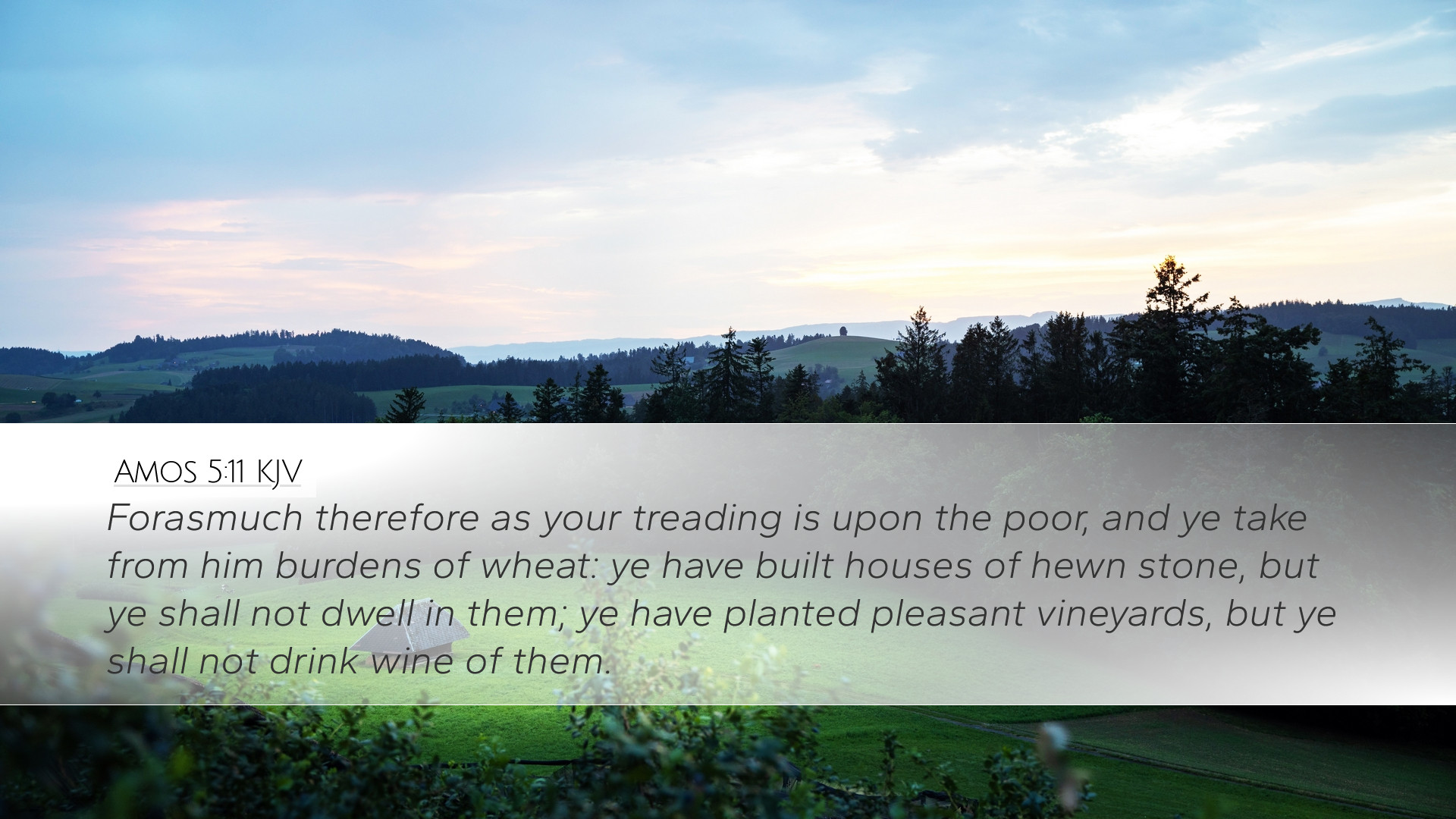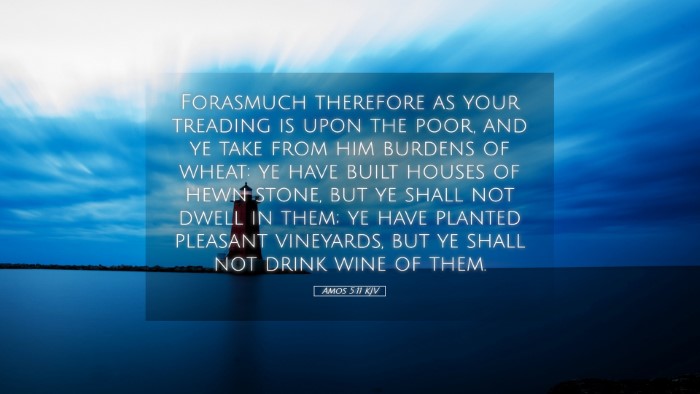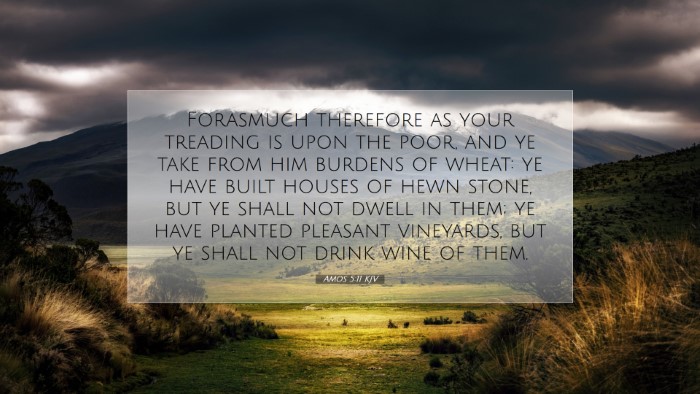Old Testament
Genesis Exodus Leviticus Numbers Deuteronomy Joshua Judges Ruth 1 Samuel 2 Samuel 1 Kings 2 Kings 1 Chronicles 2 Chronicles Ezra Nehemiah Esther Job Psalms Proverbs Ecclesiastes Song of Solomon Isaiah Jeremiah Lamentations Ezekiel Daniel Hosea Joel Amos Obadiah Jonah Micah Nahum Habakkuk Zephaniah Haggai Zechariah MalachiAmos 5:11
Amos 5:11 KJV
Forasmuch therefore as your treading is upon the poor, and ye take from him burdens of wheat: ye have built houses of hewn stone, but ye shall not dwell in them; ye have planted pleasant vineyards, but ye shall not drink wine of them.
Amos 5:11 Bible Commentary
Commentary on Amos 5:11
Verse Text: "Forasmuch therefore as your treading is upon the poor, and ye take from him burdens of wheat: ye have built houses of hewn stone, but ye shall not dwell in them; ye have planted pleasant vineyards, but ye shall not drink wine of them."
Contextual Overview
The Book of Amos is a prophetic text in the Hebrew Bible, often identified with justice and social equity. Amos, as a shepherd and a farmer, calls out the injustices that plague Israel. His ministry, taking place during the reign of Jeroboam II, reflects a time of economic prosperity for Israel but also a stark divide between the rich and the poor. His prophetic declarations not only indict the social injustices of his time but also carry a warning of impending judgment.
Verse Analysis
Amos 5:11 presents a grim critique of social injustices where the affluent exploit the economically disadvantaged. The prophet underscores the hypocrisy of the wealthy, who live in luxury at the expense of the poor. The verse initiates a contrast between the present prosperity of the wealthy and the grim fate that awaits them due to their sins.
- Treading upon the Poor: The imagery of "treading" suggests oppression. It conveys a powerful figurative language where the powerful literally walk over and exploit those beneath them.
- Burdens of Wheat: The reference to wheat signifies basic sustenance. Their action of taking away food from the poor highlights a failure of compassion and God's commandments, which prioritize care for the vulnerable.
- Hewn Stone Houses: This symbolizes the prosperity and stability of the wealthy. Yet, the text implies a transitory nature of their wealth, prophesying that they will not enjoy the fruits of their labor.
- Pleasant Vineyards: Vineyards symbolize abundance and joy. The phrase implies a grim future where the rich may exert effort yet lose the rewards of their "planting." It serves as a warning of divine judgment.
Insights from Commentaries
Matthew Henry
Matthew Henry emphasizes the inconsistency of the Israelite life wherein the rich and influential neglect the covenantal responsibilities towards their poorer brethren. He argues that their oppressive actions are not just against humanity but direct violations of God's law. Regarding the latter part of the verse, he points out that despite their hardened hearts and unjust dealings, God's justice will prevail, and the consequence will be their inability to enjoy their wealth.
Albert Barnes
Albert Barnes elaborates on the phrase "ye have built houses of hewn stone." He notes that such buildings symbolize strength and permanence, yet Barnes indicates a future reality where these homes will be inhabited by others, as divine judgment will scatter the unjust. He sees the statement as reflective of a profound truth in the human experience: that wealth, when acquired unjustly, will be rendered useless in the end. Furthermore, he stresses that the rich draw their joy from possessions rather than righteous living.
Adam Clarke
Adam Clarke's analysis echoes the themes of societal ethics raised by Amos. Clarke underscores the moral argument against taking advantage of the impoverished. He posits that the societal systems enact power dynamics that must be scrutinized under the lens of divine justice. Clarke also interprets the prophetic warnings as rooted in love, as God desires righteousness and equity among His people. According to Clarke, the prophetic announcement of calamity serves as a call to repentance and renewal, directed at turning from exploitative practices.
Theological Reflection
This verse invites contemporary readers, especially pastors and theologians, to reflect on issues of social justice that still resonate today. The exploitation of the poor remains a prevailing issue in many societies. The Scriptural affirmation of justice calls us to examine our own social systems and interactions with the marginalized. Amos' words remind believers that prosperity should accompany responsibility, and the pursuit of wealth should not betray the call to love and care for others.
Application for Today
- Addressing Injustice: Pastors are encouraged to engage with social issues within their communities actively. Preaching that reflects and addresses the injustices of the day can help create awareness and initiate change.
- Community Support: Churches should seek to support the poor and marginalized, reflecting a commitment to real-world implications of faith that aligns with the heart of the Gospel.
- Educational Efforts: Theological students and scholars are encouraged to explore the historical and cultural contexts that surround biblical texts and consider their applications in contemporary society.
- Personal Reflection: Individuals in the church are encouraged to assess their own practices of wealth acquisition. Creating awareness about consumption and generosity is necessary for embodying Kingdom values.


